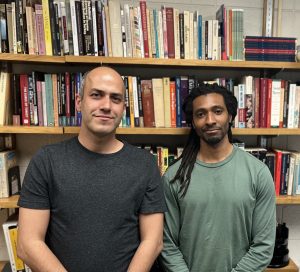News & Events
Sociologists trace capitalist relations in 14th century North Africa

In a new research project, two UNCG Sociologists, Dr. Sahan Savas Karatasli and Derek Clark (Graduate Student at Sociology Department), investigate the traces of capitalist relations in the broader Maghreb region in the 14th century. In their co-authored working paper, titled “Labor, Race, and Antinomies of Modernity: Non-debates Between Ibn-Khaldun and Modern Social Theory”, the authors discuss the political-economy of North Africa through an in-depth analysis of Arab philosopher Ibn Khaldun’s Muqaddimah. On March 23, 2022, Karatasli and Clark presented their paper at the Social Theory workshop hosted by the Department of Sociology at the University of Michigan, Ann Harbor. The workshop was dedicated to the discussion of this paper, and it yielded positive reviews and valuable feedback, as well as much excitement from the faculty reviewing the work.
Karatasli and Clark argue that Ibn Khaldun’s seminal work The Muqaddimah provides readers with an elaborate discussion of labor theory of value as later described by Adam Smith as well as an elaborate supply-demand mechanism producing a divergence between values and prices of commodities. They also claim that a close reading of The Muqaddimah provides evidence of dispossession, both voluntary and coercive forms of laboring and profit-making activities, and economic desire to produce “endless accumulation of capital” in the spheres of production, circulation, and finance in 14th century North Africa. However, it seems that these processes existed in the absence of a capitalist mode of production. Building on historical evidence beyond Ibn Khaldun’s work, Karatasli and Clark try to explain this puzzle. They suggest that during Ibn Khaldun’s time, North Africa was being incorporated into a Mediterranean economy at the periphery of an economic system centered around the Italian city-states, which showed characteristics of capitalist relations in an embryonic form since the 13th century.
In addition to discussing Ibn Khaldun’s political-economy and rethinking the evolution of historical capitalism, Karatasli and Clark’s paper also emphasizes the lack of dialogue and debate between Ibn Khaldun’s thought and modern social theory. A closer engagement with this Arab philosopher, who is seen by many as the first sociologists, will help social theory to move away from a rigidly Eurocentric theorization of modernity. The study also intends to clarify and add context to the present understanding, or in many cases misunderstandings, of Ibn Khaldun’s perspectives on race, ethnicity, and inequality. The authors explain that Ibn Khaldun was a radical constructivist in the issue of race, who did not believe in the biological nature of racial groups and racial inequalities. Karatasli and Clark argue that the dual analysis of capitalism and race in this paper will also help us dissipate some of the fog surrounding the relationship between capitalism, racism, and modernity.
Who was Ibn Khaldun?
Born in Tunis in 1332, Ibn Khaldun was of South Arabian origin with deep ties to Spain during the Muslim conquest of the region around the 8th century. His life was shaped by a pandemic, the Great Plague (i.e. the Black Death), which killed all his family, and forced Ibn Khaldun to travel all around the Mediterranean, and paradoxically helped his educational development as an Islamic scholar, litterateur, historian, and an early social scientist. His political career allowed Ibn Khaldun to travel to the eastern and western expanses of the Islamic world during this period from 1350 to his death in 1406. Ibn Khaldun journeyed from his origin, Northwest Africa (Tunis, Fez, Oran), to the Muslim influenced region of Southern Spain (Andalusia) and Northeast Africa, specifically Cairo, Egypt, where he settled for the later part of his life. A brief hiatus from political life from 1374 to 1381 afforded him time to craft his seminal work: The Muqaddimah. The Muqaddimah is one of Ibn Khaldun’s most significant contributions and serves as an introduction to a much larger collection consisting of seven books that are collectively entitled Kitab al-ibar (Book of Lessons).
Ibn Khaldun was a polymath who drew knowledge from many fields including philosophy, poetry, history, mathematics, and astronomy. With a wide array of interest, the Arab philosopher produced some of the earliest works resembling what we today call “historical sociology” and “political economy”. Due to his use of logic and rationalist method, Ibn Khaldun has been seen as one of the early founders of positivism. He was known for developing a unique historical method (that we now know as a kind of structuralist method), accurately deciphering long-term patterns from comparative analysis. Ibn Khaldun is considered by some to be the last Greek historian and the first Annaliste historian.





